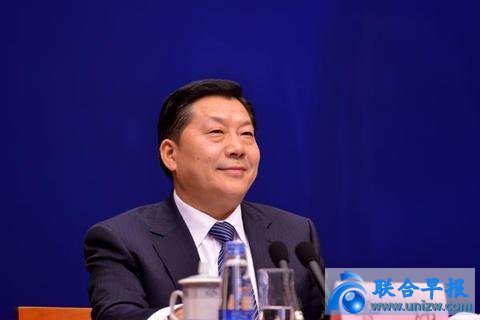Lu Wei, former deputy director of the Propaganda Department of the CPC Central Committee and former director of the State Cyberspace Administration of China, will be tried in Ningbo, Zhejiang on charges of accepting bribes.Relevant analysis pointed out that the prosecution accused Lu Wei of accepting huge sums of property, and the Central Commission for Discipline Inspection had denounced Lu Wei's bad conduct and cheating the central government in unprecedentedly severe terms. Lu Wei may receive a heavy sentence.

According to a Xinhua News Agency report yesterday, the case of Lu Wei's suspected bribery was concluded by the Zhejiang Provincial Supervisory Committee and transferred to the Ningbo City Procuratorate for review and prosecution.Ningbo prosecutors accused Lu Wei of using his power to seek illegitimate benefits for others and illegally accepting huge amounts of property during his tenure at Xinhua News Agency, Beijing Municipality, the Cyberspace Administration of China, and the Central Propaganda Department. He should be investigated for criminal responsibility for the crime of accepting bribes.
The 58-year-old Lu Wei made his fortune in Xinhua News Agency. He used to be the director of Xinhua News Agency's Guangxi branch, the secretary-general and deputy director of Xinhua News Agency. In 2011, he served as the propaganda minister of the Beijing Municipal Committee of the Communist Party of China and the deputy mayor of Beijing. In 2013, he became a newly established country.The first director of the Internet Information Office, in 2014 served as the deputy director of the Central Propaganda Department.
Being accused of extreme disloyalty to the central government is a typical two-faced person
On November 21 last year, the Central Commission for Discipline Inspection announced that Lu Wei was suspected of serious violations of discipline and was under review.
In February of this year, the Central Commission for Discipline Inspection announced the results of its investigation of Lu Wei, accusing Lu Wei of seriously violating the political discipline and rules of the CCP.Form factions, selectively implement the central government's strategic deployment of cybersecurity and informatization work, use power for color, and have no shame.
The Central Commission for Discipline Inspection also pointed out that Lu Wei was extremely disloyal to the Central Committee of the Communist Party of China. He was a typical two-faced person.Very bad, especially serious.
Analysts pointed out that the Central Commission for Discipline Inspection reprimanded Lu Wei in unprecedentedly harsh terms, which is very rare, and shows that the top leaders of the Communist Party of China are very disgusted with Lu Wei's problems and character.From April to May of this year, in accordance with high-level requirements, the provincial and municipal party committees of the CCP held meetings one after another, emphasizing that Lu Wei should be used as a warning to continue to eliminate the legacy of two-faced people like Lu Wei in the party, and that Lu Wei is the national political security.hidden dangers.
After Lu Wei became the first director of the Cyberspace Administration of China, he won the title of China's Internet Czar with his domineering style.In 2015, Lu Wei was named one of the 100 most influential people in the world by Time Magazine.
Once participated in the human milk banquet, the official denounced it as shameless
The British Financial Times once reported that Lu Wei seemed to revel in his control of the Chinese Internet and its 7shy; billion Internet users.Executives of foreign technology and media companies are also happy to befriend the former Xinhua reporter, hoping that he can help their companies enter the Chinese market.
According to anecdotal reports, at the first World Internet Conference held in China in November 2014, Lu Wei invited some foreigners and students to pretend to be experts and scholars to attend the conference in order to create a grand event.
After the incident was revealed, it aroused the anger of the high-level officials and became evidence that Lu Wei had deceived the central government.In addition, Lu Wei not only engaged in power and sex transactions, but also participated in the rumored human milk feast, which may be the reason why the official accused Lu Wei of being shameless.
In addition to Lu Wei being tried in Zhejiang, Xinhua News Agency also announced yesterday that Mo Jiancheng, the former head of the discipline inspection team of the Central Commission for Discipline Inspection at the Ministry of Finance, and Zhang Jiehui, the former deputy director of the Standing Committee of the Hebei Provincial People's Congress, will be tried in Beijing and Shanxi respectively.The cases of the three were investigated by the supervisory committees of Zhejiang, Beijing and Shanxi respectively, and then transferred to the local procuratorate for review and prosecution.
In November 2016, the reform of the supervision system led by Wang Qishan, then member of the Standing Committee of the Political Bureau of the Communist Party of China and Secretary of the Central Commission for Discipline Inspection, first took Zhejiang, Beijing and Shanxi as pilot projects.The content of the reform includes the transfer of the Anti-Corruption Bureau, which was originally under the Procuratorate, to the newly established supervisory agency. The supervisory agency and the CCP Discipline Inspection Commission belong to the same team and two brands, so as to achieve full coverage of the supervision of public servants.
Analysis: The efficiency of the new discipline inspection and supervision system has been greatly increased
Analysts pointed out that the new discipline inspection and supervision system combines the party power of the previous discipline inspection commission and the judicial power of the procuratorate into one, improving the efficiency of handling cases.Less than a year after the fall of Lu Wei and Zhang Jiehui, the case entered the stage of prosecution and trial.This shows that the government is using the new discipline inspection and supervision system to speed up the process of trialing corrupt officials.



